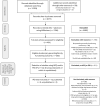Post-traumatic stress disorder, trauma and parenting stress: an individual participant data meta-analysis
- PMID: 40853506
- PMCID: PMC12379697
- DOI: 10.1080/20008066.2025.2538907
Post-traumatic stress disorder, trauma and parenting stress: an individual participant data meta-analysis
Abstract
Background: Parental post-traumatic stress disorder (PTSD) symptoms are associated with heightened parenting stress, but it is unknown whether this relation depends on the timing (childhood or adulthood) and type of trauma (interpersonal or non-interpersonal). In survivors of childhood interpersonal trauma, PTSD and parenting stress may be more strongly intertwined.Objective: This study examined whether the relation between parental PTSD and parenting stress is moderated by childhood interpersonal trauma. Findings are supplemented with information on the process of performing an individual participant data meta-analysis (IPDMA) and lessons learned.Methods: Using one-stage IPDMA, data from published studies and unpublished datasets were synthesized and analysed using multilevel linear regression.Results: Twelve datasets were included (N = 1249: 92.5% female, M age = 32.8 years, 53.8% ethnic minority). Significant and positive main effects of PTSD and childhood interpersonal trauma on parenting stress were consistently found across studies. A moderating effect of childhood interpersonal trauma on the relation between PTSD and parenting stress was not found, but this finding may be impacted by limited data coverage. The proportion of individual-level variance in parenting stress explained by the model with main and interaction effects while controlling for education level was small to medium (R2 = .12, p = .003).Conclusion: This study is the first to investigate relations among parental childhood interpersonal trauma, PTSD, and parenting stress across studies using IPDMA methodology. Despite limitations in data coverage, its findings demonstrated that links among childhood interpersonal trauma, PTSD, and parenting stress were robust across populations and settings. This implies PTSD symptom reduction may be beneficial in reducing parenting stress, regardless of whether the parent experienced childhood interpersonal trauma. Additionally, lessons learned and suggestions for how IPDMA can bring the field of trauma and PTSD research forward are presented.
Antecedentes: Los síntomas de trastorno de estrés postraumático (TEPT) en los padres se asocian con un aumento del estrés parental, pero se desconoce si esta relación depende del momento en que ocurrió el trauma (infancia o adultez) y del tipo de trauma (interpersonal o no interpersonal). En personas sobrevivientes de traumas interpersonales durante la infancia, el TEPT y el estrés parental podrían estar más estrechamente vinculados.
Objetivos: Este estudio examinó si la relación entre el TEPT parental y el estrés parental está moderada por el trauma interpersonal infantil. Los hallazgos se complementan con información sobre el proceso de realización de un metaanálisis de datos de participantes individuales (IPDMA, por sus siglas en inglés) y las lecciones aprendidas.
Método: Utilizando un IPDMA en una sola etapa, se sintetizaron y analizaron datos de estudios publicados y conjuntos de datos no publicados mediante regresión lineal multinivel.
Resultados: Se incluyeron doce conjuntos de datos (N = 1249; 92.5% mujeres; edad media = 32.8 años; 53.8% pertenecientes a minorías étnicas). Se encontraron de manera consistente efectos principales significativos y positivos del TEPT y del trauma interpersonal infantil sobre el estrés parental en los distintos estudios. No se observó un efecto moderador del trauma interpersonal infantil sobre la relación entre el TEPT y el estrés parental, aunque este hallazgo podría estar influido por la cobertura limitada de los datos. La proporción de varianza individual del estrés parental explicada por el modelo con efectos principales e interacción, controlando por nivel educativo, fue pequeña a moderada (R² = .12, p = .003).
Conclusión: Este estudio es el primero en investigar las relaciones entre el trauma interpersonal infantil en padres, el TEPT y el estrés parental mediante la metodología IPDMA. A pesar de las limitaciones en la cobertura de datos, los resultados mostraron que los vínculos entre trauma interpersonal infantil, TEPT y estrés parental fueron consistentes en diversas poblaciones y contextos. Esto sugiere que la reducción de los síntomas de TEPT podría ser beneficiosa para disminuir el estrés parental, independientemente de si el padre o madre experimentó un trauma interpersonal en la infancia. Además, se presentan las lecciones aprendidas y sugerencias sobre cómo el IPDMA puede contribuir al avance del campo de investigación sobre trauma y TEPT.
Keywords: Post-traumatic stress disorder; Trastorno de estrés postraumático; abuso infantil; child abuse; childhood interpersonal trauma; estrés parental; individual participant data meta-analysis; intergenerational transmission of trauma; meta-análisis de datos de participantes individuales; parenting stress; transmisión intergeneracional del trauma; trauma; trauma interpersonal infantil.
Plain language summary
Individual participant data meta-analysis (IPDMA) was used to analyse 12 datasets. The objective was to test whether post-traumatic stress disorder (PTSD) symptoms had a stronger effect on parenting stress when parents were survivors of childhood interpersonal trauma.Parents with more PTSD symptoms and parents who were survivors of childhood interpersonal trauma, had more parenting stress. That means reducing PTSD symptoms can probably help parents have less parenting stress. A stronger effect of PTSD on parenting stress in childhood interpersonal trauma survivors was not found, but this may be explained by data limitations.Extended information on process, methods and lessons learned is provided, to inform and inspire other researchers to consider using IPDMA methodology.
Conflict of interest statement
No potential conflict of interest was reported by the author(s).
Figures

References
-
- References marked with * are studies included in the IPDMA analysis.
-
- Abidin, R. R. (1995). Parenting stress index (3rd ed.). Psychological Assessment Resources.
-
- American Psychiatric Association . (2013). Diagnostic and statistical manual of mental disorders (5th ed).
Publication types
MeSH terms
LinkOut - more resources
Full Text Sources
Other Literature Sources
Medical
